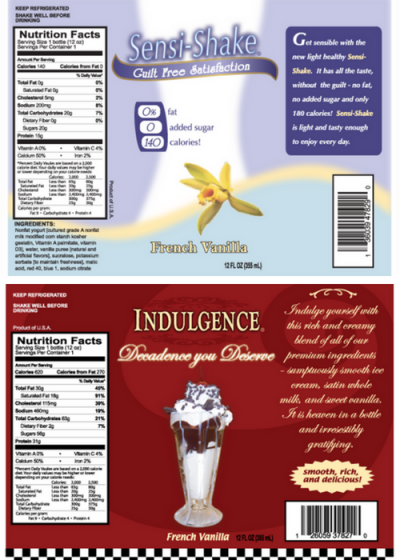Can your mind determine how many calories are in a food? Not quite, but close.
The core mission of Funtensity is to transform the emotional response to exercise to change it from something that feels like a chore to something that you want to do more.
What we believe and how we feel about what we eat and what we do can have powerful effects. Check this out…the “Mind Over Milkshakes” Study.
The same 46 people were fed the exact same milkshake (340 calories) on two separate occasions one week apart. Each time, it was labeled differently. One time, it was named “Indulgence” (label showed 620 calories, 31 g of fat, 56 g of sugar) with language like “decadence you deserve.” The other time, it was called the “Sensi-Shake” (label showed 140 calories, 0 g fat, 20 g of sugar) with “guilt-free satisfaction” on the label. (You can read the full study from the May 2011 Health Psychology here.)
The findings blew me away when I read them. Grehlin is a hormone that stimulates appetite. It rises when it is time for us to eat again and drops when we are full. The response of grehlin should be immune to how many calories we “think” are in a food since its levels rise and fall in direct response to how much we eat.
Shockingly, the grehlin response differed significantly – findings suggest that the psychological mindset of sensibility while eating may actually dampen the effect of ghrelin. After the “indulgent” shake, the grehlin response increases significantly an hour after after, but by 90 minutes had dropped steeply. After the “sensible” shake, the grehlin response went up slightly, then down slightly and stayed mostly level.
More simply, when participants drank the “indulgent” shake, they had a significantly steeper decline in ghrelin than when they drank the sensible shake. (Thinking they indulged led them to feel more satisfied for longer and get hungry later than when consuming the sensible shake.)
Implications for Food Labeling: A combination of unhealthy nutrients with healthy proclamations may be especially dangerous. Not only is the product itself unhealthy, but the mindset of sensibility might correspond to an inadequate suppression of ghrelin, regardless of the actual nutrient makeup.
“Low-fat” foods can often have high fat content but still carry less fat than their full fat counterparts. Another product might tout its high fiber content but have far too much sugar in it.
As the study’s authors conclude, “This juxtaposition of unhealthy nutrients with healthy proclamations may be especially dangerous. Not only is the product itself unhealthy, but the mindset of sensibility might correspond to an inadequate suppression of ghrelin, regardless of the actual nutrient makeup.”
There is a lot of good publicity in calling your product healthy and there are countless examples of foods that are marketed that way, but aren’t.
Perhaps if we can begin to approach even the healthiest foods with a mindset of indulgence, we will experience the physiological satisfaction of having had our cake and eaten it too.
We can’t think ourselves thin (or rich, or anything else – there always has to be action). However, our perceptions can affect how our body reacts to different foods and different activities so our mindset matters.


One Response to "Magical Wizard Brain Powers?"